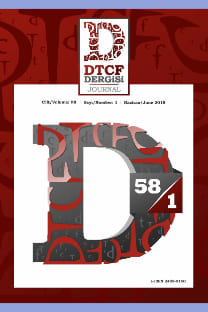THOMAS HARDY'NİN ŞİİRLERİNDEKİ TEMSİL KRİZİ*
CRISIS OF REPRESENTATION IN POEMS BY THOMAS HARDY
___
- Berger, Sheila. "Iconology and Epistemology in Thomas Hardy's Works: The Image and the Eye." Thomas Hardy and Visual Structures: Framing, Disruption, Process. New York: New York UP, 1990. 3-18.
- Derrida, Jacques. Of Grammatology. Trans. Gayatri Chakravorti Spivak. Cor. Ed. Baltimore: The Johns Hopkins UP, 1997.
- ---. "This Strange Institution Called Literature: An Interview with Jacques Derrida." Deconstruction: Critical Concepts in Literary and Cultural Studies. Ed. Jonathan D. Culler. Vol. 2. London: Routledge, 2003. 3-34. Google Book Search. Web.11 Temmuz 2015.
- Descartes, René. "Third Meditation: Of God, That He Exists." Meditations on First Philosophy: with Selections from the Objections and Replies. A New Translation by Michael Moriarty. Oxford World's Classics. Oxford: Oxford UP, 2008. 25-38.
- Emig, Rainer. Modernism in Poetry: Motivations, Structures and Limits. London: Longman, 1995.
- Felperin, Howard. "Deconstruction Reconstructed." Ch. 4. Beyond Deconstruction: The Uses and Abuses of Literary Theory. Oxford: Oxford UP, 1985. 104-147.
- Google Book Search. Web. 11 Temmuz 2015.
- Hardy, Florence Emily. The Later Years of Thomas Hardy, 1892-1928. Cambridge Library Collection. New York: Cambridge UP, 2011. 58-59.
- Hardy, Thomas. Thomas Hardy: The Complete Poems. Ed. James Gibson. Houndmills: Palgrave, 2001.
- Heidegger, Martin. Being and Time. Trans. John Macquarrie ve Edward Robinson. 7th Ed. Oxford: Blackwell, 1962; 2001.
- Lacan, Jacques. Ecrits: The First Complete Edition in English. Trans. Bruce Fink. New York: W. W. Norton & Company, 2006.
- Lanzano, Ellen Anne. "Chronicles of Love: The Time of Lyonnesse." Hardy: The Temporal Poetics: Studies in Nineteenth-Century British Literature. Ed. Regina Hewitt. Vol. 10. New York: Peter Lang, 1999. 75-109.
- Levinson, Marjorie. "Object-Loss and Object-Bondage: Economies of Representation in Hardy's Poetry." ELH 73.2 (2006): 549-580. JSTOR. Web. 23 Eylül 2014.
- Miller, Hillis J. The Linguistic Moment: From Wordsworth to Stevens. Princeton: Princeton UP, 1985.
- Morgan, William W. "Form, Tradition, and Consolation in Hardy's Poems of 1912- 13." PMLA 89. 3(1974): 496-505. Modern Language Association. JSTOR. Web. 23 Eylül 2014.
- ---. "The Partial Vision: Hardy's Idea of Dramatic Poetry." Thomas Hardy: Poems: A Selection of Critical Essays. Ed. James Gibson ve Trevor Johnson. London: Macmillan, 1979. 244-52.
- Nietzsche, Friedrich. "On Truth and Lies in Their Non Moral Sense" (1873). The Portable Nietzsche. Ed. ve Çev. Walter Kaufmann. New York: Penguin, 1965. 42-47.
- Page, Norman. "Opening Time: Hardy's Poetic Thresholds." Thomas Hardy Reappraised: Essays in Honour of Michael Millgate. Ed. Keith Wilson. Toronto: U of Toronto P, 2006. 262-269.
- Riquelme, John Paul. "The Modernity of Thomas Hardy's Poetry." The Cambridge Companion to Thomas Hardy. Ed. Dale Kramer. Cambridge: Cambridge UP, 2003. 204-223.
- Shires, Linda. "Hardy and Nineteenth-Century Poetry and Poetics." Thomas Hardy
- Studies. Ed. Phillip Mallet. London: Palgrave Macmillan, 2004. 255-279.
- Ward, John Powell. "Hardy's Aesthetics and Twentieth-Century Poetry." Thomas Hardy Studies. Ed. Phillip Mallet. London: Palgrave Macmillan, 2004. 279-303.
- Widdowson, Peter. "Hardy and Critical Theory." The Cambridge Companion to Thomas Hardy. Ed. Dale Kramer. Cambridge: Cambridge UP, 2003. 73-92.
- ISSN: 0378-2905
- Yayın Aralığı: 2
- Başlangıç: 1942
- Yayıncı: Ankara Üniversitesi Dil ve Tarih-Coğrafya Fakültesi
FURUG FERRUHZÂD'IN "KÂBUS" ÖYKÜSÜ ÜZERİNE METİNDİLBİLİMSEL BİR ÇÖZÜMLEME
GÜLŞEN TORUSDAĞ, SONER İŞİMTEKİN
1897-1910 KORE'NİN POLİTİK DURUMU VE DEHAN İMPARATORLUĞU
Özlem GÖKÇE, MAHMUT ERTAN GÖKMEN
HATIRALARIN IŞIĞINDA BALKAN SAVAŞLARI
HAYATTA KALMA BAĞLAMININ BELLEK YANILMALARI ÜZERİNDEKİ ETKİSİ1
MİNE MISIRLISOY, Suzan CEYLAN, NART BEDİN ATALAY
EŞİKTEKİ JUDE: FELAKET GETİREN BİR ARAYIŞ MI?
İNCE YA DA KESKİN SIZI?: PINTER'IN İNCE SIZI'SINDA FREUDYEN UNCANNY
ES-SUYÛTÎ'NİN "ET-TEBERRÎ MİN MA'ARRATİ'L-MA'ARRÎ" ADLI URCÛZESİ VE TE'LÎF SEBEBİ
OSMANLIDA ZAHİRE MÜBAŞİRİ OLMAK: ZİŞTOVİLİ HACI ALİ ÖRNEĞİ (1749-1755)
